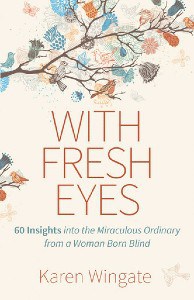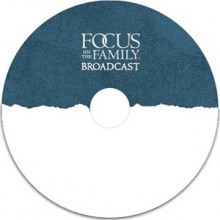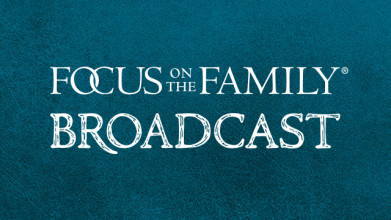Preview:
Karen Wingate: God’s working. You may not be able to see it. You may have to wait 55 years before you can see again. You may not see in this lifetime. You may not see the answers to the prayers that you have prayed. But God sees, God knows, God’s working behind the scenes in the background, to bring about His greater purposes for your life.
End of Preview
John Fuller: Hm. That’s Karen Wingate, describing how God performed a major miracle in her life. And it’s quite an inspirational story. We’ll hear more on today’s episode of Focus on the Family. Thanks for joining us. Your host is Focus president and author Jim Daly. And I’m John Fuller.
Jim Daly: John, we read pretty consistently throughout Scripture, miracles that God performs in the Bible. Sometimes I think in the modern world, we lose track of that. We don’t see that. I hear stories about that occurring in Africa and places in the, you know, Asia and other areas. But sometimes here in Western civilization, we’re just not as in tune with those kinds of things. Sometimes, obviously, God’s working miracles through the skills of people He’s equipped. And that happens. Um, this story today is really gonna be encouraging, I think, in every way. I’m looking forward to talking to our guest about what occurred in her life, the way she used to see things, and now how she’s seeing things.
John: Mm-hmm.
Jim: It’s gonna be really illuminating.
John: I agree with you. Jim. And Karen Wingate is a writer for Proverbs 31 Ministries, and has her own personal blog, and enjoys sharing her story with churches and communities and school groups. Karen and her husband Jack live in Tucson, Arizona. And she’s written a book about her journey called With Fresh Eyes: 60 Insights into the Miraculously Ordinary from a Woman Born Blind. We can tell you more about that book at focusonthefamily.com/broadcast.
Jim: Karen, welcome to the program.
Karen: It is good to see you. It is good to be seen.
Jim: (laughs) I love that. Well we kind of, you know, let the, uh, cat out of the bag there, With Fresh Eyes. Um, let’s start there. I mean, you’re a little girl. You can’t see. Describe your, uh, medical condition with your eyes, uh, when you could understand that you were a little different from others.
Karen: I was born with a genetic defect where the h- whole eye structure was underdeveloped. And so when I was born, I basically could see what you would see out of the, um, through an industrial-strength shower curtain.
Jim: Hm.
Karen: I had about eight different surgeries throughout childhood that would bring my visional acuity up to, um, legal blindness. But still, there was just a host of other problems. This was back in the ’60s, when surgery techniques were not as- not as advanced as they could have been. And so while they did give me more vision, they also did some more damage on my eyes. So-
Jim: Hm. Interesting.
Karen: … but at- you know, up to age nine, I really didn’t know that I was different from other kids. I went to public school. I struggled socially, but didn’t realize why.
Jim: Huh.
Karen: I didn’t understand why some kids could sit in the back of the room and still see the board. I had to sit right in the front row.
Jim: Yeah.
Karen: But it didn’t- it just didn’t connect. But at age nine, I- I got the idea that I don’t see as well as other children. And that it wasn’t going to get any better.
Jim: Yeah, let me ask you in that regard, because a- um, children have so many issues, right? There’s different things that affect them. That emotional battle for you: um, how did your parents help you manage that? How did you manage that? E- especially nine, 10, 11, 12? When these things are becoming apparent, and you know you’re not quite complete, physically, that way. How d- how did you manage that emotionally?
Karen: I think my family didn’t realize that my vision was as bad as it was. But they took the attitude of, “You’ve got two eyes; use them. If you drop something on the floor, instead of feeling around for it, get on your nose and look for it. Use your eyes.” That might sound harsh-
Jim: Hm.
Karen: … but it was getting me to use what I had, and depend on my eyes as much as I could. Um, I- my mother let me do things she probably had no business letting me do.
Jim: (laughs) But she was trying to s- give you confidence in some ways.
Karen: Yes.
Jim: Right?
Karen: Yes. And the family was very good at helping us see things. L- getting us closer to things. Helping us to explore our world. A friend of mine recently said, “By doing that, they used curiosity to squelch fear of the unknown.”
John: Hm.
Jim: Yeah. I mean, you can do that with a completely able child, right?
Karen: Oh, absolutely.
Jim: That’s the same concept. So that’s kind of- that’s great they didn’t treat you differently. “Here’s how we’re gonna do it.”
Karen: That’s right.
Jim: And- and give you that confidence and that strength. Let me ask you: uh, at nine years old, this was an exciting time for all of us children. I was eight, so I think we’re only about a year apart in age. But, uh, the Apollo 11 landing on the moon. And this was a landmark for you. It was for me. I just love the concept; I was into outer space as an eight-year-old boy. I followed the Apollo mission, all of the testing they were doing. And my mom was probably sick of me asking her questions about it-
Karen: (laughs)
Jim: … at the time. “Like, okay, what’s this? What’s a rocket ship? And …” But I was into it. And you also were into it. But what happened with your experience?
Karen: It was two days after my final childhood surgery. I had come home from the hospital. My family had gathered in front of our 13-inch black-and-white television-
Jim: (laughs)
Karen: … to watch the landing on the moon. And I remember my grandfather saying, “Pay attention. Because this is a moment you will never forget.” Well, I was sitting literally six inches away from the TV, trying to make out the blurry blobs. And it was disheartening to me. He said his g- uh, Neil Armstrong said his great line of, you know, “One small step for man, one giant leap for mankind.”
Jim: Yeah. How did you feel about that?
Karen: I felt stuck.
Jim: Yeah. Hm.
Karen: Because I wasn’t going anywhere. I had- I came to the realization that I couldn’t see.
Jim: Huh.
Karen: And I was different. And how was I going to go do great things like Neil Armstrong?
Jim: Wow.
Karen: So that was on a Saturday. Monday morning, I came into the kitchen and just I was so discouraged.
Jim: Hm.
Karen: With who I was, and that I couldn’t see. And the surgery hadn’t done any good. And my mother, who was conservative in her faith and didn’t express these kind of thoughts, said to me, “Karen, God can do miracles.” And that’s all she said.
Jim: Hm.
Karen: So for the next week, every morning, I would pull the covers up over my head, shut my eyes really tight, and I’d say, “Lord, let this be the day that I can see.”
Jim: Mm-hmm.
Karen: And I’d slowly pull the covers down, open my eyes … nothing.
Jim: That’s a- an incredible challenge for a child, ’cause your mom’s encouraging you. Obviously, you had a childlike faith. You talked about God right there. I don’t know if that- how that developed. Maybe you could share a bit about that. But, now, I would think you’re not hearing from God directly. He’s not answering that prayer. How did- how-
Karen: You’d think that would destroy my faith.
Jim: Right. That’s where I was going. How did you hang on, even though it looked hopeless?
Karen: You know, I- I look back at that moment, and I’m surprised at myself. I prayed that prayer for two weeks, every day. Then it was every other day. I prayed that all summer long. And finally, I said, “Lord, if You’re not going to heal my vision, then just help me cope. Help me get through life with this.”
Jim: That’s amazing that you made that, uh, adaptation to the environment. But you’re still loving and kind toward the Lord. So you didn’t blame Him.
Karen: I didn’t think to blame Him.
Jim: Yeah. That’s a big step.
John: Hm.
Jim: That’s really important. Well, let’s move along, because I want to get into the content of the book, which is powerful, about your observations. Uh, at 55, describe what’s taking place. Your mother’s comment that miracles happen way back then, when you were nine … and what’s going on at 55.
Karen: At 55 I have lived a full, contented life. I have accepted who I am as a visually impaired person. I’ve raised two children, my husband’s a pastor. I’ve involved myself in- in a writing ministry, uh, for years. I lived with the realization that someday I may lose the rest of my vision. My eyesight is so fragile; the whole eyeball structure is so compromised. And so the day came that I noticed some of those little changes. And I said something to my doctor, and she went, “Well, it might be dry eyes. But let’s have you checked out by a specialist. Your eyes are so complicated.”
Jim: Yeah.
Karen: “Let’s move you on to a specialist.” He found out that there was a tear in my retina, in my left eye. It was an old tear, so there really wasn’t much that he could do. “But we’ll watch it. Come back in three months.”
Jim: Mm-hmm.
Karen: Came back in three months; it was worse. And he decided that surgery was necessary, but also recognized that it was a risk. He said to me, “Your vision could be better. It could stay the same as it is today. Or it could be worse. I can’t predict, but I will do the best I can.”
Jim: Hm.
Karen: Surgery was done under local anesthesia, because of the nature of retina surgery. The surgery was taking longer than I thought it should. And about two-thirds of the way through the surgery, he said to me, “Mrs. Wingate, I don’t usually like to make these kind of predictions, but I think I can guarantee that you will see better than you have ever seen before.”
Jim: Whoo … How’d that make your heart feel?
Karen: Ah- pardon the pun, but I didn’t see it coming.
Jim: (laughs)
John: (laughs)
Jim: Fair enough. (laughs)
Karen: And my second thought was, “What does ‘better than ever’ look like?”
Jim: Right.
Karen: I- because I had no clue. I’ve lived with a visual impairment all my life. I’m used to blurry blobs and undefined landscapes.
Jim: Hm.
Karen: So I spent the rest of the time … First of all, worshiping a god that could do such a thing at age 55.
Jim: Yeah.
Karen: And I also started constructing bucket lists of things that I wanted to see for the first time.
Jim: Well, let me- let me slow that down a little bit. Because I want to just get back to that point. I’m sure you had a bandage over your eye, I would assume. There was a process for healing. And then what- how many days later … When did that first time you could actually look and- and know that the doctor was right? That you now see better?
Karen: It took about four to six weeks.
Jim: Yeah.
Karen: Before I noticed the first change. And so there’s always that suspension of belief of, “Is this really true? Was the doctor right? How long is this going to take?” I hate recovery. It takes so long.
Jim: Well, that, and you don’t know.
Karen: And you don’t know.
Jim: And that’s-
Karen: But you’re still-
Jim: … uneasy.
Karen: … dreaming, you hold on to that dream. And the- the dream and the hope is what kept me laying face down through recovery: knowing that someday this is going to be better.
Jim: Hm.
Karen: And isn’t that so true of our spiritual lives?
Jim: Hm.
Karen: That we look towards Heaven and know that life is going to be better? And that hope helps us move along. And keep going.
Jim: Right. That is what hope is. You know? You me- in this life, there’s going to be trials and tribulations. But in the life to come, something far better. That’s hope. So describe that, when the- your vision, the clarity, came. What did it look like? What did you see for the first time? What were the things that you noticed?
Karen: You know, we all wonder … And people- people were waiting with me, of “What is going to be the first thing?” Is it going to be leaves on trees? Which is the quintessential thing that third-graders see when they get a pair of glasses. Is it going to be flowers? Is it going to be my husband’s face? The first thing that I saw were the numbers on the bathroom scale.
John: (laughs) Oh, wow.
Jim: (laughs) Okay, you’ve got a sense of humor.
Karen: God does.
Jim: Yeah.
Karen: (laughs)
Jim: Wow, that was the first thing that popped out when your eye is recovering. That’s funny.
Karen: Uh, I had gone to weigh myself, because I’m a woman.
Jim: (laughs)
Karen: I’m red-blooded woman. I’ve been laying on my belly for three weeks. And I want to see if I’ve gained any weight.
Jim: Yeah.
Karen: And normally, I have to get nose down to the scale to see the digital readout. And it was blurry … Well, I don’t have my new glasses yet. And, you know-
Jim: Yeah.
Karen: I just have to wait. So I stood erect, gave one last little look at the scale, and the numbers were just crystal clear.
Jim: Oh, my. And that was the first-
Karen: And that was the first-
Jim: … pop.
Karen: … that I knew this was real. So why did God allow that-
Jim: Yeah.
Karen: … to be the first? Number one, I think, it was just Him and me in that bathroom.
Jim: Yeah.
Karen: And He wanted the glory, He wanted me to share that moment with me alone. It was- it was just such a private moment, where I could just worship Him and share the joy with Him.
Jim: And most of us can’t imagine what that would be like. Because we have our senses, right? And- but what a moment. “I can see.”
Karen: I can see.
John: Yeah.
Jim: I mean, that- that had to be incredible. How’d you then begin to apply this to the world around you? You came out of that bathroom probably thinking of everything in your life.
Karen: Oh, what else? What’s next?
Jim: Your mom’s miracle comment.
Karen: Yeah.
Jim: The Lord, “Lord, you delivered.” It’s amazing. And now, how does a sighted life begin to unfold for you? What do you notice? What jumps out at you?
Karen: I- as I said during surgery, and during recovery, I had a bucket list of things that I wanted to see. And so I was out to go explore those things. But a lot of those things I couldn’t do. I couldn’t take a trip to Niagara Falls the next day to go check that out. And so I learned to look at the ordinary things of life. And I realized that God had His own bucket list over here of what He wanted to see. And that the miracle was not just physical healing. But a new relationship with God as He helped me to see who He was, through the physical things that I was seeing for the first time.
Jim: Ah.
Karen: And I discovered a world that is extravagant, lavish, creative, precise, permanent, and so full of detail and variety. I was- that was the big thing that I could see most: was the detail of objects. Before it had just been this sort of undefined blur. And now I could see the detail. I looked out this morning at the, uh, the Front Range.
Jim: Pike’s Peak. Yeah.
Karen: And Pike’s Peak. And before, it was just a purple blurry blob when I was here in 1990.
Jim: Ah.
Karen: Today I could see the crags and the, um, ranges behind ranges. And the foothills and the green and s- the rock and the snow on Pike’s Peak. A- and I’ve been a Christian all my life, and I just accepted that people- “Okay, God created the world. Yeah.” There is no doubt in my mind that only a divine presence could have orchestrated such a creation. It is too precise. It is too magnificent and detailed. And so it was learning who He was, what His character was like, why He would do this. Why He would construct such a lavish world. And who He did it for? He did it for us. We are in the front row of His audience hall.
Jim: Yeah. I love it. And I love that enthusiasm that you’re expressing. Again, because I think those of us that have our senses … our sight, our hearing, et cetera … We do take it for granted. It’s just normal; it’s every day. We look at the mountain. We may say, “Lord, that is beautiful. Well done.” Which I do. But when you only saw a blur or a blob, and now you see it in clarity … What a different impression it makes.
John: Yeah. Well, this is a powerful conversation today with Karen Wingate. And, uh, we’ll encourage you to get her book, in which she has, uh, 60 insights into the miraculously ordinary. Uh, the title is With Fresh Eyes, and we have copies of that book here. Our number is 800, the letter A, and the word FAMILY. 800-232-6459. Or stop by focusonthefamily.com/broadcast.
Jim: Karen, let me ask you: um, describe how you saw geese one day. And again, this is just a very specific illustration that you used in the book. But it helps us better understand what you were seeing and feeling. Um, you saw those geese, I guess, from a distance. And you quietly asked God to maybe let you see it a little closer. Is that accurate?
Karen: I heard the geese.
Jim: Okay, you heard them. Okay.
Karen: These were snow geese, not Canadian geese. And they often foraged in barren fields in Illinois, where we lived at the time. And I could hear their honking, and I- I thought, “Oh, I’ve always wanted to see geese.” Because before, all I could see in the sky was these little black specks, that I didn’t know if they were floaters in my eyes or flies or geese.
Jim: (laughs)
Karen: No, I didn’t know. So I prayed, “Oh God, it would be so nice if you could bring the geese closer.” Which almost sounds like a five-year-old. “Oh please, let me see this.” Um-
Jim: I like that.
Karen: … but pretty soon, the geese started … I could hear from their honking, that they were coming closer. And I looked up; the geese were right over my head.
Jim: Hm.
Karen: In two very straight lines, so low that I could see their white underbellies and the spread of their wings.
Jim: Hm.
Karen: I’d never seen that before. And I thought to myself, “Why just right over my head? Why not a block to the south or a mile to the north?”
Jim: Hm.
Karen: “They’re right over my head. Is that possible that God answered my prayer? That He would alter the trail of geese so that I could see them?” We don’t know. I can’t prove that.
Jim: Yeah. I love the Scriptures. It says, “Ask and you will receive.” (laughs) You did.
Karen: Absolutely. And, you know, can God do that? Yes! He’s God. If He created it, He can alter it.
Jim: Yeah. I mean, that’s beautiful. Let me ask you: again, uh, moving through all those experiences. What are some practical ways you would encourage the audience to look at God’s creation differently today? I mean, they’re hearing your story. I’m sure they’re impacted by it. “Wow, that’s an amazing story.” But what- what are your observations for us?
Karen: You mentioned about we go out and we see the mountains, and, “Beautiful. Well done, God.” And I would say, take more time. Pause.
Jim: Hm.
Karen: Ask yourself, “What am I seeing?” Look for those details. Look for the craggy mountains and the snowcaps. And then ask yourself, “What does this tell me about God and His nature?” Go out. Be intentional. Set your alarm clock. And, um, my friends have told me that they do this. That since my- my vision has improved, they have actually intentionally gone out and seen the sunrise. I’ve a girlfriend who, she and I share, uh, sunrise pictures with each other.
Jim: That’s great.
Karen: And that’s our intention: to go out and see- see the sunrise for today and ask, “How is this different than yesterday’s sunrise?”
Jim: Yeah.
Karen: Or, “How is her sunrise in Illinois different than my sunrise in Tucson?” Only God could make sunrises different every day, and different in different locales. And ever-changing, second by second. And so it becomes a worship experience of appreciating the beauty, and the, uh, the precision-
Jim: Yeah.
Karen: … of, and, uh, the variety that God is capable of doing.
Jim: So, we’ve covered that look of nature. The aha of that for you, and not being able to see it, now being able to see it. How did God challenge you to see others differently? People around you? What observations did you have with humanity, as you gained your sight?
Karen: Those are the things that I didn’t expect. It’s easy to immediately think about nature and creation, but the improvement in vision just impacted all facets of life for me.
Jim: Mm.
Karen: And- and before, I- I couldn’t see people unless they were right up close to me, and I never had a chance to really learn their face well enough. So I had great difficulty recognizing people. And I was always afraid that when someone would say, “Huh, she’s not very friendly. She didn’t say ‘Hello’ to me this morning.”
Jim: Right.
Karen: Because I couldn’t see them!
Jim: (laughs) Right. “Cut me a little slack.”
John: (laughs)
Karen: I guess I functioned so well that people forgot that I couldn’t see.
Jim: Oh, wow.
Karen: Of course, new- new people didn’t know that the min- minister’s wife had a- had a vision issue. So I- I one day had a list of 12 people I had to see that Sunday morning, to check up on women’s programs, a children’s program. Ask So-and-So how their surgery went this week, ask someone else how their son was doing. And in desperation, I said, “Oh Lord, would you please help me find these people?” By the end of that Sunday, I had found every single one of those people; they had intersected my path.
Jim: Without you having to manipulate it.
Karen: Right.
Jim: That- that’s amazing.
John: Mm-hmm.
Karen: And I guess I’m a-
Jim: (laughs)
Karen: … slow learner. You know? I’m in my late 40s by this point. So the next Sunday, I felt a little bit ashamed about how selfish I was in asking God to bring to me these people I wanted to see.
Jim: Hm.
Karen: So the next time, I said, “Lord, who do You want me to see?”
Jim: Something simple. That was amazing.
Karen: That was a game changer.
Jim: Hm. Yeah.
Karen: That was a huge game changer.
Jim: How so?
Karen: In the way I perceived all of my social relationships: because the people that then came to me, came with very different motives and different needs. And I was able to go deeper with them, have deeper spiritual conversations, have times of prayer with them. And I- my next step was, “Okay, if this can happen at church, what about the grocery store? What about where I work? What about even when I come home? Lord, who do You want me to see? And how do You want me to see this person?”
Jim: Yeah.
Karen: “Not just physically, but what are their spiritual needs? What are their emotional needs? What do You want me to see about them in this moment?”
Jim: Yeah. Karen, the lingering factor is that the Lord did give you your miracle … at least for one eye. And He, uh, through that doctor, allowed you to be healed so you could see. I’m sure people are listening, that they’re still waiting. They haven’t had that moment. They’re still counting on their mom’s nine-year-old promise. You know?
Karen: Yeah.
Jim: “Hey, God’s in the- the business of miracles.” But decades have flown by, and they haven’t seen it. What word of encouragement would you have for them?
Karen: There’s a verse that has meant so much to me, from Isaiah 42:16, if I can read it. “I will lead the blind by ways they have not known. Along unfamiliar paths I will guide them. I will turn the darkness into light before them, and make the rough places smooth. These are the things that I will do. I will not forsake them.”
Jim: Hm.
Karen: You may think that God has a certain plan for you. You may want a certain thing. And yes, God may mean that for you. But He may have even bigger ideas, better ideas. Whatever His plan is for you, He is not done with you yet. He is making you ready for His answer. I think I said in my book that God has not promised He will answer immediately. But He has promised that He will answer.
Jim: Yeah.
Karen: And his ways are bigger and better than anything that we can imagine, as Ephesians 3:20 says. So we- you may be waiting for a certain thing. But God may be saying, “Hold on. I’ve got something better for you that you can’t even begin to imagine.”
Jim: Mm-hmm.
Karen: “Trust me.”
Jim: Yeah. And, you know, again, maybe in this life, but certainly in the life to come.
Karen: Oh, I’m so looking forward to Heaven.
Jim: Where there’s no tears … Yeah. And you know, that’s where that fulfillment of that promise ultimately will be done too, if you don’t experience here on Earth.
Karen: But, you know, Jim? We have the idea that 20/20 is perfect vision. And some people say, “Oh, well, y- yours wasn’t a miracle because you didn’t get 20/20 vision. Yours only goes up to 20/80.”
Jim: You got a half a miracle.
Karen: Uh, yeah.
Jim: (laughs)
Karen: But, you know, if you think about it; 20/20 is just a human standard.
Jim: Hm.
Karen: What are we going to see in Heaven? We may even have better vision than 20/20. And in any event, we’ll still be able to see and know and understand s- far- things far better in that life, in our eternal life, than what we have here on Earth.
So Heaven is truly our better-than-ever.
Jim: This has been so good, Karen. I, uh, so appreciate the opportunity to meet you, talk with you. I love your spirit. I love that tenacity that you have. And that would be my other encouragement for people that feel overwhelmed by something; whatever it might be. A physical impairment, whatever it might be. Just develop that tenacity in Christ: that, “I’m not gonna let this bench me. I’m not gonna let this put me on the side of the road of life. I’m gonna press forward, get two degrees. Do the things that God has called me to do.” I just so appreciate that persevering spirit, and, uh, you demonstrate it so well. Thank you for being with us.
Karen: Thank you very much.
Jim: And folks, uh, what an encouraging story. And we want to get a copy of this book, With Fresh Eyes, into your hands. Get ahold of us. If you can make a donation of any amount, we’ll send it to you as our way of saying “Thank you.” And as we do so often, John, if you can’t afford it, we’re a Christian ministry. We’ll get it into your hands. Just let us know that you want it, but you can’t pay for it. And, uh, we’ll send it out to you, trusting that others will cover the cost for that. We simply want you to hear this message, because it is so encouraging. And hopefully, lead you not only in your faith, but also to deepen your faith in Christ.
John: Hm. Yeah, that’s a real core goal of ours at Focus on the Family. But we’re a phone call away. 800, the letter A, and the word FAMILY. Where you can donate, and find further details at focusonthefamily.com/broadcast. On behalf of Jim Daly and the entire team, thanks for joining us today for Focus on the Family. I’m John Fuller, inviting you back next time, as we once again help you and your family thrive in Christ.





















